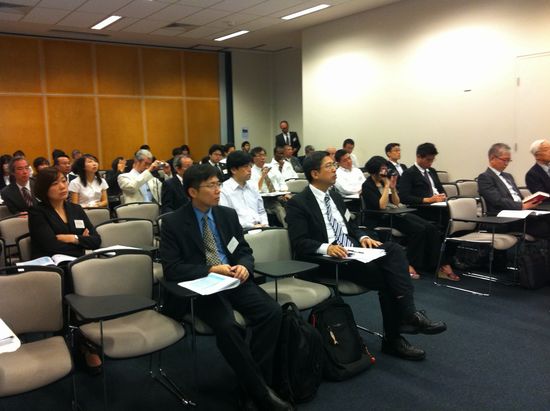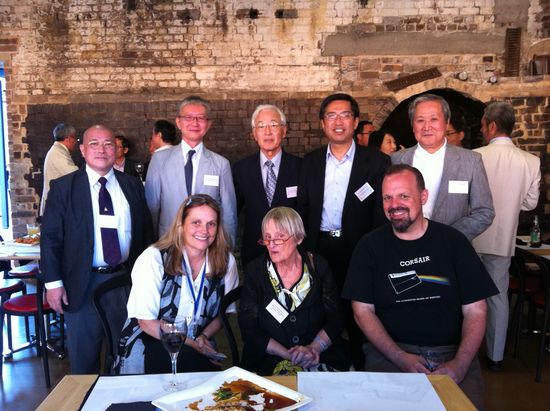


Taiwan’s Morakot Post-Disaster Reconstruction Experience becomes Focus of Discussion at International Symposium

The 9th International Symposium on Social Management Systems by the Society for Social Management Systems (SSMS) took place on December 3rd and 4th at the University of Western Sydney in Australia. President of the SSMS Symposium, Morakot Post-Disaster Reconstruction Council CEO Dr. Chern Jenn-Chuan, was invited to give a keynote speech on Taiwan’s experience in the Typhoon Morakot Post-Disaster Reconstruction Implementation of the Rainbow Sustainable Community, which won recognition and praise from representatives all over the world.
In his keynote speech, CEO Chern pointed out that reports from the United Nations have indicated that the challenge of climate change is an important issue, which the current generation must face. As major natural disasters have taken place frequently in recent years, such as the destruction in Philippines after super Typhoon Haiyan, the Asian Development Bank (ADB) reminded countries to fortify disaster response resilience and recovery capacities in its 2013 report, in order to lessen the impact that major disasters have on citizens’ income and welfare. He stated that the core experience Taiwan has gained through Typhoon Morakot post-disaster reconstruction is “efficiency, respect and innovation”, “state and private cooperation between governmental”, “private, and corporate organizations”, “as well as disaster prevention and simultaneous reconstruction”. Faced with residents who had to evacuate and relocate after the disaster, he stated that the Taiwanese government proposed the “Rainbow Sustainable Community development blueprint”, which focused on the traits of the new community, new immigrants, and new life at permanent housing communities. The plan emphasizes first achieving safe residences and then facilitating gainful employment. The blueprint included multi-directional reconstruction efforts encompassing employment, industry, education, culture, life, ethnicity, spirituality, religious faith, and the future. For four years, the Typhoon Morakot post-disaster reconstruction efforts have been implemented continuously. The aim is not just to recover, but also to find rebirth in a safe, human-centric, innovative, and sustainably developed manner. Taiwan’s Morakot post-disaster reconstruction experience has become a classic sample of reconstruction after a major disaster for nations around the world.
The theme of this symposium was “Jobs, Lives and the Hearts of our People”. During the symposium, it was pointed out that when the symposium was hosted in Taiwan last year, members witnessed Taiwan’s effective governmental leadership and management capabilities in Morakot post-disaster reconstruction. This was especially apparent in the model of cooperation between governmental and private organizations to consolidate resources dedicated towards post-disaster reconstruction of basic infrastructure, homeland reconstruction, and industrial reconstruction. This year, focused discussions were held regarding topics such as post-disaster employment, life, and psychological and spiritual reconstruction in disaster victims. Chief Secretary of Morakot Post-Disaster Reconstruction Council, Chang Herng-yuh, was also invited to attend the symposium. He made three presentations in-group discussions at the symposium on issues such as psychological and spiritual reconstruction, cultural reconstruction, industrial reconstruction, and livelihood after Typhoon Morakot. Secretary General Chang also accepted the 2012 best paper award from the SSMS on behalf of Chief Wang Zheng-yi of the Kaohsiung City Government Urban Development Bureau (former office chief of the Kaohsiung City Reconstruction Council).
The SSMS was founded in 2005 by Professor Hajime Okamura, the president of Kochi University of Technology in Japan (former president of the Japan Society of Civil Engineers). This was one of the 21st Century Center of Excellence (COE) programs, which Japan’s Ministry of Education, Culture, Sports, Science and Technology (MECSST) subsidized in 2004. The main concept of the SSMS is founded on scientific social management systems for social infrastructures. Members of this international organization come from various key nations in Europe, the United States, Japan, and Asia. The first president of the SSMS was Dr. Patricia Galloway, former President of the American Society of Civil Engineers and a member of the US National Science Board. The current president of SSMS is Dr. Chern Jenn-Chuan of Taiwan, former president of the Asian Civil Engineering Coordinating Council.
President Chern hosted the opening ceremony for the 2013 International Symposium on Social Management Systems. The principal of 2013 the University of Western Sydney, Janice Reid, then welcomed guests with a speech on behalf of the host nation. It was estimated that more than a hundred experts from Japan, Australia, Indonesia, Thailand, Germany, China, Taiwan, and other nations participated in the symposium. Over the two-day span of the event, there were 20 group discussions and nearly a hundred papers presented.

SSMS Founder Hajime Okamura and Members






